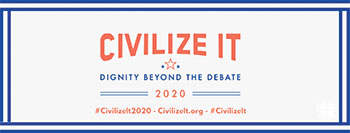Columns use USCCB initiative to help prepare for elections
 Compiled by archdiocesan staff of Human Life and Dignity Office and Social Concerns Ministry
Compiled by archdiocesan staff of Human Life and Dignity Office and Social Concerns Ministry
They’re almost here: the Nov. 3 elections.
Much of the conversation in our communities, parishes and families—not to mention on social media—is likely already influenced by the upcoming elections in our country. Opinions abound about for whom we should vote, which issues are important and even what makes a faithful Catholic.
As Catholics, we must also remember to be people who are hopeful, joyful and loving, who always remember that Christ is King and we are building his kingdom, not our own, and that each person with whom we interact is made in the image and likeness of God.
Catholics are called in a special way as the elections approach to commit to deeper prayer, study and action surrounding how to live our faith in this moment in the history of our country.
It is in this spirit that the archdiocesan Office of Human Life and Dignity and the Catholic Charities-Social Concerns ministry are collaborating to offer a seven-week series of columns to help members of the archdiocese prepare for the Nov. 3 elections.
The content will be based on the United States Conference of Catholic Bishops’ (USCCB) 2019 yearlong initiative prior to the November 2020 elections called “Civilize It: Dignity Beyond the Debate,” or simply “Civilize It.” The effort is built on the recognition that every person—even those with whom one disagrees—is a beloved child of God who possesses inherent dignity.
Each column will offer one prayer, one informational paragraph and one action to help readers spiritually prepare for the November elections.
This week’s column focuses on civility.
Pray: Make Me an Instrument of Your Peace–A Prayer for Civility
Lord, make me an instrument of your peace. Where uncivil words prevail, show me how to model love. Help me remember the God-given dignity of all and invite others to do the same. Show me how to build bridges and not walls and see first what unites us rather than how we diverge. Let me seek to understand before asking to be understood. Give me a listening heart filled with empathy and compassion. May I be clear in sharing my own position and respectful and civil in describing those of others. Let me never tolerate hateful ideas. May I invite all to charity and love. Lord, help me to imitate your compassion and mercy. Make me an instrument of your peace. Amen. (Inspired by “Nine rules for civility from the Catholic tradition” by Pittsburgh, Pa., Bishop David A. Zubik, America magazine, June 26, 2018)
Learn: ‘Who is my neighbor?’
Jesus uses the parable of the Good Samaritan to answer a question that is both searing and simple: “Who is my neighbor?” (Lk 10:29). Our familiarity with this parable makes it easy for us now to identify as “neighbor” those on the margins of our society, such as those experiencing homelessness or poverty.
But how often do we see our neighbor in the person who disagrees with us? As Catholics, our strong tradition of social teaching compels us to be actively engaged in the building up of our communities.
This is achieved by being involved in the political process. And yet today, many shy away from such involvement because our national and local conversations are filled with vitriol and harsh language, often directed at people themselves.
When personal attacks replace honest debate, no one wins. This kind of attack, no matter the reason, only serves to further divide our communities.
What is needed is good, honest, civil dialogue. This means that we must always—including during discussions— treat everyone as worthy of being at the table, worthy of our respect and worthy of being heard. In short, it means treating everyone as our neighbor.
Act: Take the ‘Civilize It’ pledge
The following pledge is part of the “Civilize It” initiative. Take the pledge as an individual, family or community. Anyone and everyone can commit together to honor human dignity through civil conversation.
I pledge:
-
Civility: To recognize the human dignity of those with whom I disagree, treat others with respect, and rise above attacks when directed at me.
-
Clarity: To root my political viewpoints in the Gospel and a well-formed conscience, which involves prayer, conversation, study and listening. I will stand up for my convictions and speak out when I witness language that disparages others’ dignity, while also listening and seeking to understand others’ experiences.
-
Compassion: To encounter others with a tone and posture which affirms that I honor the dignity of others and invites others to do the same. I will presume others’ best intentions and listen to their stories with empathy. I will strive to understand before seeking to be understood.
(For more information, including tips for engaging in civil dialogue, go to www.civilizeit.org.) †
